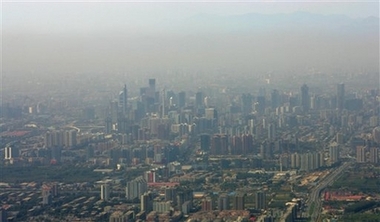China needs daily pollution fines, official |
文章来源: 文章作者: 发布时间:2006-10-09 07:08 字体: [ 大 中 小] 进入论坛 |
(单词翻译:双击或拖选)
|
|

| A layer of smog hangs over central Beijing, as seen from a plane Wednesday, Oct. 4, 2006. Severe pollution is increasingly sparking unrest in rural areas, where the environmental has all too often been sacrificed for profit -- worrying the government and prompting repeated promises of cleanups. |
| Oct. 7 - China should slap daily fines on firms that pump untreated waste into lakes and rivers, because current penalty limits make long-term pollution profitable, an official was quoted on Saturday as saying.
Normally, fines for pollution are capped at 200,000 yuan ($25,300) regardless of how long a factory ignores pollution regulations, the official China Daily said.
China's per-capita water resources are less than a third of the global average and falling, and its problems are compounded by chronic1 pollution, waste and poor management. Around 300 million people lack access to safe drinking water.
A daily charge would give companies an economic incentive2 to clean up their waste, the paper quoted Mao Rubai, chairman of the Environmental and Resources Protection Committee of China's parliament, as saying.
"The punishment should be calculated from the day that a factory is found guilty of pollution discharge until the day its emissions3 meet environmental protection requirements," Mao said.
His views were backed by a study by China's State Environmental Protection Agency, which has suggested daily fines of 40,000 yuan up to 100,000 yuan, the report added.
More than one quarter of the water in the Yangtze River, China's longest, is so polluted that it cannot be treated to make it drinkable. Most of the Yellow River -- the cradle of Chinese civilisation4 -- is not fit for drinking or swimming either.
Beijing is currently looking into revising its Clean Water Act, which came into force in 1984, the paper added.
|
点击  收听单词发音
1
chronic

|
|
| adj.(疾病)长期未愈的,慢性的;极坏的 |
参考例句: |
- Famine differs from chronic malnutrition.饥荒不同于慢性营养不良。
- Chronic poisoning may lead to death from inanition.慢性中毒也可能由虚弱导致死亡。
|
2
incentive

|
|
| n.刺激;动力;鼓励;诱因;动机 |
参考例句: |
- Money is still a major incentive in most occupations.在许多职业中,钱仍是主要的鼓励因素。
- He hasn't much incentive to work hard.他没有努力工作的动机。
|
3
emissions

|
|
| 排放物( emission的名词复数 ); 散发物(尤指气体) |
参考例句: |
- Most scientists accept that climate change is linked to carbon emissions. 大多数科学家都相信气候变化与排放的含碳气体有关。
- Dangerous emissions radiate from plutonium. 危险的辐射物从钚放散出来。
|
4
civilisation

|
|
| n.文明,文化,开化,教化 |
参考例句: |
- Energy and ideas are the twin bases of our civilisation.能源和思想是我们文明的两大基石。
- This opera is one of the cultural totems of Western civilisation.这部歌剧是西方文明的文化标志物之一。
|
|
|
|
|
 收听单词发音
收听单词发音 
